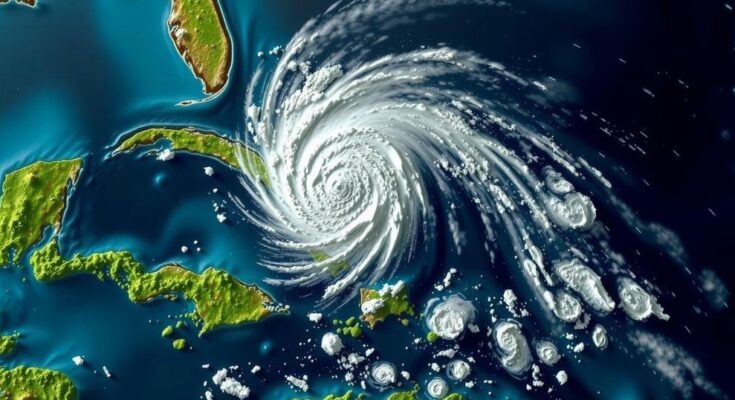Hurricane Rafael, expected to strengthen and impact Cuba, may hinder the development of Tropical Storm Sara in the southwestern Atlantic. Current chances for Sara are at 30 percent over the next week. While Rafael will weaken after impacting Cuba, it could affect the new system’s chances of formation and intensification, creating indirect threats, especially to the Florida Keys.
The potential formation of Tropical Storm Sara in the southwestern Atlantic is facing significant challenges due to the approach of Hurricane Rafael. This storm was classified as a hurricane on Tuesday night and is expected to strengthen before making landfall in Cuba. Current meteorological assessments indicate that the likelihood of the new system becoming Tropical Storm Sara stands at 30 percent over the next week, yet its proximity to Hurricane Rafael complicates its development significantly. Hurricane Rafael, which is currently a Category 2 storm with sustained winds of 115 mph, is anticipated to weaken after crossing Cuba but may retain hurricane characteristics as it re-emerges in the Gulf of Mexico. There are concerns regarding how Rafael’s presence will influence the system attempting to form in the western Atlantic, which has generated disorganized showers and thunderstorms near the Leeward Islands. AccuWeather experts warn that Rafael’s trajectory could inhibit the chances of development for the emerging system, effectively reducing its odds for intensification. AccuWeather senior meteorologist Alan Reppert articulated that the environmental conditions are unfavorable for the new system’s development, stating, “The current track of Rafael affects the chances to develop over the next few days from being close by.” Should Tropical Storm Sara materialize, it is predicted to affect regions including the northern Caribbean and the southern Bahamas, with potential targeting of Florida as it progresses. Despite the turmoil posed by Hurricane Rafael, the storm also brings indirect threats to coastal regions in the Florida Keys, manifesting as coastal flooding and the possibility of tornadoes. Moreover, the National Hurricane Center has indicated that even without further development, the existing system will likely result in rainfall across northern parts of the central Caribbean and southern Bahamas.
Currently, the Atlantic hurricane season is under scrutiny with the formation potential of new storms increasing in particular regions. In this context, Hurricane Rafael has recently manifested, complicating the prospects for other systems trying to develop. As meteorologists assess various atmospheric factors that impact storm formation and intensity, proximity to existing hurricanes poses unique challenges, often leading to detrimental effects on the viability of newly forming systems. Understanding the dynamics and interactions between storms is crucial for effective forecasting and preparedness measures.
In summary, Hurricane Rafael’s development poses significant complications for the potential emergence of Tropical Storm Sara in the southwestern Atlantic. While forecasts indicate a moderate chance for this system to form, prevailing conditions and Rafael’s influence may deter its progression. Meteorological analyses will continue to monitor both systems closely, as they may have wide-reaching impacts on the Caribbean and adjacent coastal areas, particularly Florida. The continual assessment of these weather patterns is imperative for effective public safety and preparedness.
Original Source: www.newsweek.com




